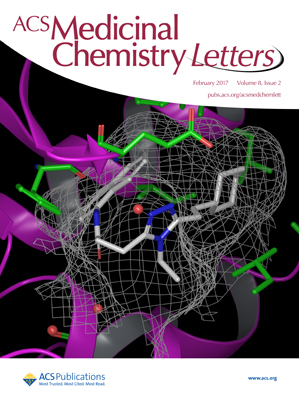Targeting KRAS G12D Mutations: Advances in Small Molecule Inhibitors and PROTAC Technology.
IF 4
3区 医学
Q2 CHEMISTRY, MEDICINAL
ACS Medicinal Chemistry Letters
Pub Date : 2025-04-10
eCollection Date: 2025-05-08
DOI:10.1021/acsmedchemlett.5c00179
引用次数: 0
Abstract
KRAS mutations drive approximately 25% of human cancers, with KRAS G12D being the most prevalent and challenging to target. Recent advances have led to developing small molecule inhibitors that selectively target the active GTP-bound state of KRAS G12D, blocking downstream signaling and oncogenic activity. These compounds show strong therapeutic potential.
靶向KRAS G12D突变:小分子抑制剂和PROTAC技术的进展
KRAS突变驱动大约25%的人类癌症,其中KRAS G12D是最普遍和最具挑战性的目标。最近的进展导致开发出小分子抑制剂,选择性地靶向KRAS G12D的活性gtp结合状态,阻断下游信号传导和致癌活性。这些化合物显示出很强的治疗潜力。
本文章由计算机程序翻译,如有差异,请以英文原文为准。
求助全文
约1分钟内获得全文
求助全文
来源期刊

ACS Medicinal Chemistry Letters
CHEMISTRY, MEDICINAL-
CiteScore
7.30
自引率
2.40%
发文量
328
审稿时长
1 months
期刊介绍:
ACS Medicinal Chemistry Letters is interested in receiving manuscripts that discuss various aspects of medicinal chemistry. The journal will publish studies that pertain to a broad range of subject matter, including compound design and optimization, biological evaluation, drug delivery, imaging agents, and pharmacology of both small and large bioactive molecules. Specific areas include but are not limited to:
Identification, synthesis, and optimization of lead biologically active molecules and drugs (small molecules and biologics)
Biological characterization of new molecular entities in the context of drug discovery
Computational, cheminformatics, and structural studies for the identification or SAR analysis of bioactive molecules, ligands and their targets, etc.
Novel and improved methodologies, including radiation biochemistry, with broad application to medicinal chemistry
Discovery technologies for biologically active molecules from both synthetic and natural (plant and other) sources
Pharmacokinetic/pharmacodynamic studies that address mechanisms underlying drug disposition and response
Pharmacogenetic and pharmacogenomic studies used to enhance drug design and the translation of medicinal chemistry into the clinic
Mechanistic drug metabolism and regulation of metabolic enzyme gene expression
Chemistry patents relevant to the medicinal chemistry field.
 求助内容:
求助内容: 应助结果提醒方式:
应助结果提醒方式:


